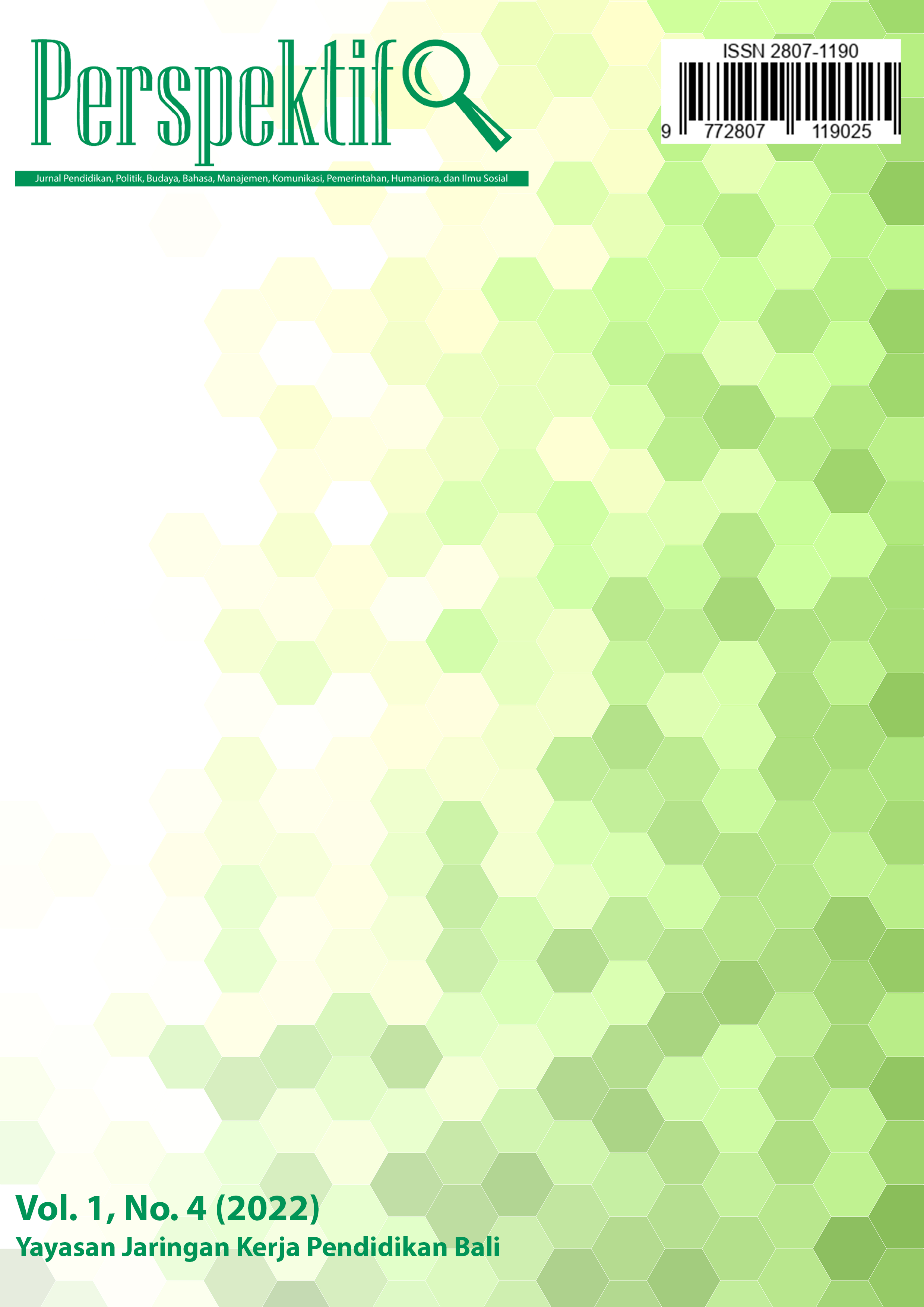SEBUAH STUDI AKUNTABILITAS BISNIS
DALAM SEKOLAH WARALABA ISLAM
DOI:
https://doi.org/10.53947/perspekt.v1i4.215Kata Kunci:
Strategi , Pengembangan Sekolah , Pendidikan, Strategy, School Development, EducationAbstrak
Abstrak
Tujuan penelitian ini adalah untuk menggali strategi pengembangan sekolah Waralaba di Malang. Data primer dikumpulkan melalui wawancara pada pemilik waralaba dan observasi langsung terhadap kegiatan sekolah. Hasil dari penelitian ini menunjukkan adanya akuntabilitas pasar dalam bentuk dokumentasi di media sosial dan media massa. Praktik ini adalah upaya mengembangkan pendidikan di tengah dinamisasi aturan dan regulasi. Akuntabilitas diterjemahkan sebagai mekanisme untuk mendapatkan kepercayaan orang tua dan untuk memperoleh siswa dan investor baru. Akuntabilitas juga sebagai upaya pengendalian (Control) agar kualitas pendidikan di tiap cabang sesuai dengan keinginan pemilik. Bentuk pengendalian mutlak di tangan pemilik. Sehingga pemahaman tentang nilai perlu digali apakah sesuai dengan ajaran Islam atau tidak. Praktik Manajemen bisnis modern tampak dominan dalam praktik sekolah waralaba yang menjadi objek penelitian. Hal ini menjadi kurang sejalan dengan misi awal yang menyatakan bahwa sekolah seharusnya dikelola berdasarkan misi sosial. Pada akhirnya, artikel ini diharapkan mampu memperkaya studi tentang akuntabilitas.
Abstract
The purpose of this study was to explore strategies for developing franchise schools in Malang. Primary data were collected through interviews with franchise owners and direct observation of school activities. The results of this study indicate the existence of market accountability in the form of documentation on social media and mass media. This practice is an effort to develop education amidst the dynamics of rules and regulations. Accountability is translated as a mechanism to gain parental trust and to acquire new students and investors. Accountability is also an effort to control (Control) so that the quality of education in each branch is in accordance with the wishes of the owner. The form of absolute control in the hands of the owner. So the understanding of values needs to be explored whether it is in accordance with Islamic teachings or not. Modern business management practices seem dominant in the practice of franchise schools which are the object of research. This is not in line with the initial mission which stated that schools should be managed based on a social mission. In the end, this article is expected to be able to enrich the study of accountability.
Referensi
Allen, J. (2004). Sociology of education: Possibilities and practices. Social Science Press.
Anthony, R. N., & Govindarajan, V. (2004). Management control systems. MacGraw-Hill ; Irwin.
Bogdan, R., & Taylor, S. J. (1992). Pengantar Metoda Penelitian Kualitatif (A. Furchan, Penerj.). Penerbit Usaha Nasional.
Collin, S. M. H. (2012). Dictionary of accounting. A & C Black.
Creswell, J. W. (2014). Research Design: Qualitative, Quantitative, and Mixed Methods Approaches. SAGE.
Dillard, J. F. (1991). Accounting as a Critical Social Science. Accounting, Auditing & Accountability Journal, 4(1). https://doi.org/10.1108/09513579110143849 DOI: https://doi.org/10.1108/09513579110143849
Fikri, A. (2013). AKUNTABILITAS NON GOVERMENTAL ORGANIZATION. Jurnal Ilmiah Akuntansi Dan Humanika, 2(2), Article 2. https://doi.org/10.23887/jinah.v2i2.1669
Hariyani & Serfianto. (2011). Membangun Gurita Bisnis Franchise. Pustaka Yustisia.
Kotler, P. (2003). Manajemen Pemasaran (Kusmayadi & E. Sugiarto, Penerj.). Gramedia Pustaka Utama.
Kovach, H., Neligan, C., & Burall, S. (2003). Power without accountability? (hlm. 50).
Lehman, G. (1999). Disclosing new worlds: A role for social and environmental accounting and auditing. Accounting, Organizations and Society, 24(3), 217–241. https://doi.org/10.1016/S0361-3682(98)00044-0 DOI: https://doi.org/10.1016/S0361-3682(98)00044-0
Lehman, G. (2005). A critical perspective on the harmonisation of accounting in a globalising world. Critical Perspectives on Accounting, 7(16), 975–992. https://doi.org/10.1016/j.cpa.2003.06.004 DOI: https://doi.org/10.1016/j.cpa.2003.06.004
Lickona, T. (1992). Educating for Character: How Our Schools Can Teach Respect and Responsibility. Bantam.
McMillan, J. H. (2007). Classroom Assessment: Principles and Practice for Effective Standards-based Instruction. Pearson/Allyn & Bacon.
Megawangi, R. (2017). Menyemai Benih Karakter. Indonesia Heritage Foundation (IHF).
Nixon, D. (2005). Extending: Child Development from Five to Twelve Years. Thomson.
Randa, F. (2011). Akuntabilitas Organisasi Gereja: Pemaknaan dan Rekonstruksi Inkulturatif Nilai-Nilai Budaya Lokal (Studi Etnografi pada Gereja Katolik di Tana Toraja) [Doctor, Universitas Brawijaya]. http://repository.ub.ac.id/160677/
Sagala, S. (2005). Konsep dan Makna Pembelajaran Untuk Membantu Memecahkan Problematika Belajar dan Mengajar. Alfabeta.
Silvia, J., & Ansar, M. (2011). AKUNTABILITAS DALAM PERSPEKTIF GEREJA PROTESTAN (STUDI FENOMENOLOGIS PADA GEREJA PROTESTAN INDONESIA DONGGALA JEMAAT MANUNGGAL PALU). 25.
Simanjuntak, D. A., & Januarsi, Y. (2011). AKUNTABILITAS DAN PENGELOLAAN KEUANGAN DI MASJID. 31.
Suradika, A. (2000). Metode Penelitian Sosial. UMJ Press.
Van den Branden, K. (2015). Sustainable Education: Exploiting Students’ Energy for Learning as a Renewable Resource. Sustainability, 7(5), 5471–5487. https://doi.org/10.3390/su7055471 DOI: https://doi.org/10.3390/su7055471
Wahid, A. (2006). Islamku, Islam Anda, Islam Kita. The Wahid Institute.
Unduhan
Diterbitkan
Cara Mengutip
Lisensi
Hak Cipta (c) 2022 Perspektif

Artikel ini berlisensiCreative Commons Attribution-ShareAlike 4.0 International License.












